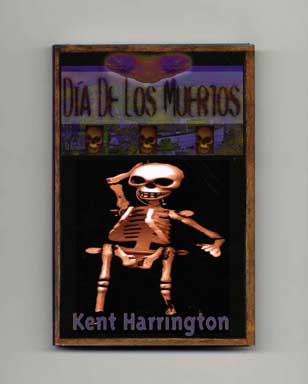Llegué a Kent Harrington gracias a un artículo sobre su último opus, “Tabloid Circus”, donde el crítico bañaba al escritor de halagos y lo describía como “uno de los más originales autores de novela negra norteamericana”. Como esa es una categoría increíblemente competitiva, decidí echarle un ojo al autor.
Pues cuál fue mi sorpresa cuando encontré uno de sus libros en venta en formato digital… Por sólo 89 centavos de euro. Sí: *ochenta y nueve centavos*, o medio boleto para el transporte público. El libro físico, en el mismo sitio de Amazon, costaba 13 euros, un precio que, si bien es bajo, no puede jamás competir con su doppelgänger electrónico, aparte de que lo recibes a los 30 segundos, no cinco días después, por correo.
La verdad, ha sido un gran hallazgo. “Día de los muertos/Day of the dead”, el libro en cuestión, es una divertidísima novela negra sobre un agente corrupto de la DEA que trabaja como coyote, llevando gente a los Estados Unidos. En medio del ambiente húmedo y sudoroso que plantea Harrington, el agente Calhoun debe lidiar con un brote de dengue que ha contraído, aparte de las deudas de apuestas que también ha contraído y que lo obligan a tomar decisiones cada vez más arriesgadas.
Si tienes 89 centavos y estás buscando una novelita para llevar a la playa este verano, “Día de los muertos”, de Kent Harrington es una excelente opción.
“En México, los años cincuenta no habían muerto. Marilyn Monroe no había muerto. El machismo no había muerto. Siempre colgaba un pequeño olor a gente sobreexcitada, como entrar a un cuarto donde alguien acaba de tener sexo”.
“You don’t understand Mexico. Look out the window. What do you see?” Calhoun turned around and looked at the skyline. “One very fucked-up city.” “No. That’s property, amigo. Twelve people own this country. Twelve. Sometimes we don’t get along, and there’s a misunderstanding and then something like this happens,” Guzman said. “You’re saying twelve people own Mexico?” “Yes…and I have their phone numbers. Now one of them wants to own it all.” “That wouldn’t be you, would it? Or are you just an innocent billionaire?” Guzman laughed. “It’s the same in your country. Look at the headlines…Forbes, Perot. What’s the difference?” “Yeah – what about democracy, asshole…it isn’t the same at all.” “That’s very funny. Tell me something, gringo, how many political killings has your country had in the last twenty years?” “What do you mean?” “We’ve had many in Mexico; how many have you had?” Calhoun looked at him, suspicious. “What are you getting at?” “Look at the streets in Los Angeles. What difference is there between any of your big cities and Mexico City, now? People living in the streets, billionaires running things. Why do you think you’re so different…because everyone has television? Go to the poorest parts of Mexico City or Tijuana, what do you see? TV antennas. You’re just like us now; but you don’t want to admit it. You walk through a ghetto and see a streetlight and call that democracy. The greatest country on earth. Isn’t that what your anchorpeople call it? Look out that window, amigo, the view is the same everywhere now. Jakarta to New Jersey… It’s over.” “Shut up,” Calhoun said. “We are different. We aren’t anything like this stinking country. We have rules and laws and you can drink the fucking water”.



Pingback: Devaluación y golpe de Estado | Los cuadernos azul y marrón